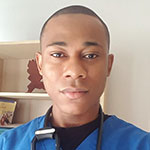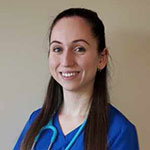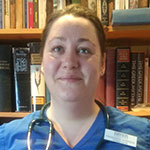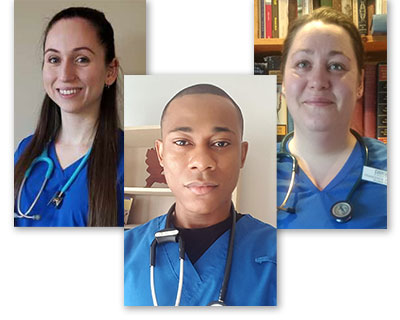Over 40 Nursing students complete program early
On April 17, over 40 members of the Class of 2020 Dawson College Nursing Program completed their program. This was about two weeks ahead of schedule to allow the new graduates to contribute to the healthcare system now.
All the competencies have been met
“We reviewed the competencies to determine which students were in a position to graduate,” recalled Cathy Moore, Chair of Nursing at Dawson. “After consulting with the Nursing faculty, we believe that the majority of the third-year students have met all the competencies of the program and are ready to graduate. Nursing students started the semester on Jan. 3 and they are finishing earlier than most other students at Dawson.”
This is an extraordinary measure because of the acute shortage of healthcare workers in the context of the COVID-19 pandemic. The decision was made to take a proactive approach to contributing to the healthcare system before potentially being asked by the Ministry of Education.
“To my knowledge, Dawson College is the first English CEGEP to make this decision,” Cathy said.
Final grades submitted April 17
Final grades were submitted to the Registrar’s Office on April 17. Each student’s file is being verified to ensure they meet all the criteria to graduate, including requirements that are outside the Nursing department, such as the successful completion of the General Education courses and the English Exit Exam.
Dawson College will then forward the names of the students who have graduated to the Ordre des infirmières et infirmiers du Québec (OIIQ, the Quebec Order of Nurses). Having a diploma in Nursing entitles a person to hold the status of CEPI (candidate ou candidat à l’exercice de la profession infirmière).
Order fast tracking attestations
Once the graduate has a job, they must apply for an AECEPI, an attestation to exercise the profession as a graduate pending licensing. This attestation will allow the graduates to practice nursing with oversight from nurses until they can write the OIIQ certification exam in the fall (date to be determined). The Order has stated it will fast track the issuance of these attestations.
“This is unprecedented,” said Cathy. “The students were thankful and excited about graduating. We have told them that their teachers are here for them if they need to talk. In addition, some of the teachers are offering optional classes. We will also be offering review sessions to our graduates prior to the OIIQ exam.”
Wedcher Remy, Nursing Class of 2020

Wedcher Remy is one of the Nursing graduates. He is looking forward to working in the profession.
“This is a national emergency and it has been my lifelong aspiration to work in health care,” Wedcher said. “If I am called upon to help, I certainly will.”
Wedcher has a job waiting for him at the McGill University Health Centre (Glen site) in the cardiac surgery unit.
Wedcher feels ready, even though he is a little anxious about graduating during a pandemic. “We already have good knowledge about how to care for patients with severe respiratory problems, and how to use personal protective equipment,” he said.
Best Nursing education
Wedcher, who is 31, is proud that he was able to complete the program in three years while working part time. “It was very challenging. Sometimes I had to plan my day down to the minute to get everything done,” he said. “I chose to be a nurse and there is great satisfaction to see someone’s health restored. I am eager and ready to work. I believe that we received the best Nursing education at Dawson College.”
Emily Caputo, Nursing Class of 2020

Emily Caputo is 21 and another new Nursing graduate. “Nursing makes me feel like I have a purpose,” she said. “The patients have a huge impact on me, and I see the impact I have on them. I came home happy from my stages.”
Emily has really appreciated the support of her Nursing teachers and feels privileged to have experienced something similar to an old-fashioned apprenticeship. “The teachers were always there to support us, guiding us to what is right,” she said. “Sometimes we would experience shocking things and it could be hard on us emotionally. It was nice to have the teachers to talk to.”
Job waiting at the JGH
Geriatrics is Emily’s favourite department. “I love older people; they have so many stories and so much history to share,” she said. Emily has a job waiting for her in Internal Medicine at the Jewish General Hospital, “a good place to stay and learn,” she says.
The pandemic came as a shock to Emily: “It is something scary, but as long as precautions are taken, it should be ok.” Emily is very close to her grandparents. She will miss them when she begins to work. “Nursing is a combination of science and interacting with people. I am ready to go,” she said.
Francesca Robinson, Nursing Class of 2020

Francesca Robinson, a 34-year-old mother of two young daughters, is also a new graduate of Nursing. “When I began the Nursing program, my daughter was one,” she said. “During the program my second daughter was born, and my father became very ill and died. It was hard, but I have a very supportive husband.”
Francesca is impressed by the calibre of her fellow classmates. “There are so many awesome students. Some are raising children as single mothers. Many are volunteering outside of school and work, including a student working at a refugee centre and other students volunteering at programs in the community.”
Passionate and giving
“You have to be really passionate and giving to be a nurse,” Francesca said.
The teachers at Dawson did their “absolute best” to deliver the semester online, according to Francesca. “The College, the teachers and the students all did their best to make it work,” she said.
Francesca enjoys working in the Emergency department the most. “When the pandemic happened, it changed everything. If I have to go into self-isolation anyway, I might as well go where I can contribute the most,” she said. “We are being encouraged to serve in the CHSLDs (long-term care facilities). It is important for me to go where the needs are greatest. Later, I can work where I am most interested.”
Proud to be a nurse
Francesca is very happy to be a nurse. “You can do a lot of good and have a positive impact on your community,” she said. “This job is very worthwhile. You can earn money, take care of your kids, and be proud of your work.”
Francesca has a number of job opportunities and is not yet sure where she will work. “I am staying useful for now by volunteering at a suicide hotline, an essential service.”
On the ICU frontlines at the Glen
If anyone has a good idea of what it will be like for Dawson’s new Nursing graduates to work on the COVID-19 frontlines, it is 2nd year Nursing teacher Yvette Marks.
Yvette is a full-time teacher in Medical/Surgical Nursing and works part-time in the Intensive Care Unit at the McGill University Health Centre (Glen site).
“All 35 beds in the ICU at the Glen are used exclusively for COVID-19 patients,” she said. “We were well prepared, and we are well supported by our nurse managers and doctors. We are constantly updated and there are COVID-19 nurse clinician specialists to support us. ”
The COVID-19 routine
Yvette has worked many shifts since the pandemic began. “I leave the house in my civilian clothes and am met at the hospital entrance by security guards who ask a series of questions about symptoms. If anyone has symptoms, they cannot go inside. Health workers, who have symptoms, are sent to the basement of the parking lot for a test in their car and then go home to wait for the results.
“For the rest of us, we enter after the exchange with the guards. There is mandatory hand sanitizing. We wear masks on the unit because we cannot always maintain a physical distance of six feet from our colleagues. Then I change into my hospital uniform and put on my personal protective equipment, including N95 mask, visor, gown, gloves before entering the patient’s room.”
There are nurse runners outside the negative pressure rooms of the COVID-19 patients who will get or collect anything needed by the nurse, doctors, respiratory technicians and other staff caring for the patients. “We cluster our care and at the moment, we are one nurse for every patient,” Yvette said. The nurse-patient ratio will change as the unit fills up.
Inside the COVID-19 rooms
Baby monitors were ordered for the ICU and are being used as hands-free communication between the nurse in the negative pressure patient rooms and the nurse runners and nurses outside. To maintain the negative pressure in the patient’s room, the two negative pressure doors cannot be open at the same time. It is critical for communication to be clear and effective among nurses on the unit.
“Psychologically, this is new and everyone’s scared,” Yvette said. “However, as long as we follow the protocol, then we’ll be safe. To my knowledge, no nurses in my unit have become sick from COVID-19.”
Amazing seeing patients leave ICU
Yvette has had the privilege of seeing some patients come off the ventilators and leave the ICU. “It is amazing to see a patient leave,” she said. It is very different work since all the patients are sedated, as per the COVID-19 protocol, and there are no visitors. According to Yvette, some of the patients do recover. “We have not had many deaths,” she said.
Volunteering for more shifts while teaching full-time
Yvette has a full teaching load, but has volunteered to take more shifts on weekends because of the great need. Until now, things are very well organized and going smoothly at the MUHC and Yvette feels good about working there.
Dawson College currently has just under half of its Nursing teachers working part-time in the healthcare system. Most teachers continue to have a full teaching load at Dawson College.



